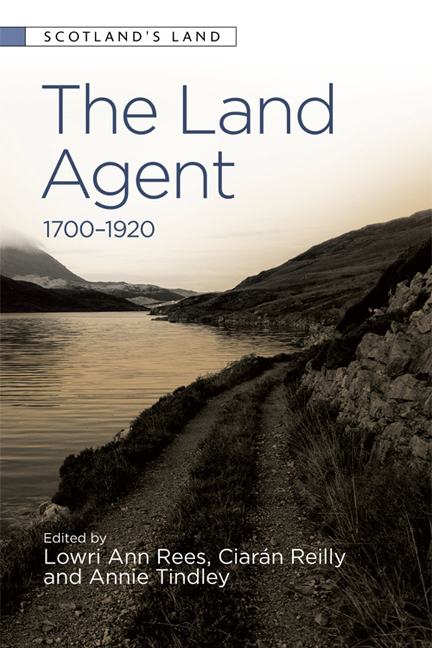Book contents
- Frontmatter
- Contents
- List of Figures
- Acknowledgements
- Notes on the Contributors
- Map of the British and Irish Isles
- Introduction
- Part I Power and its Constructions on Landed Estates
- Part II The Transnational Land Agent: Managing Land in the Four Nations and Beyond
- Part III Challenges and Catastrophe: The Land Agent under Fire
- 7 The Tenant Right Agitation of 1849–50: Crisis and Confrontation on the Londonderry Estates in County Down
- 8 Frustrations and Fears: The Impact of the Rebecca Riots on the Land Agent in Carmarthenshire, 1843
- 9 The Evolution of the Irish Land Agent: The Management of the Blundell Estate in the Eighteenth Century
- 10 ‘Between two interests’: Pennant A. Lloyd's Agency of the Penrhyn Estate, 1860–77
- Part IV Social Memory and the Land Agent
- Postscript
- Index
10 - ‘Between two interests’: Pennant A. Lloyd's Agency of the Penrhyn Estate, 1860–77
from Part III - Challenges and Catastrophe: The Land Agent under Fire
Published online by Cambridge University Press: 11 August 2018
- Frontmatter
- Contents
- List of Figures
- Acknowledgements
- Notes on the Contributors
- Map of the British and Irish Isles
- Introduction
- Part I Power and its Constructions on Landed Estates
- Part II The Transnational Land Agent: Managing Land in the Four Nations and Beyond
- Part III Challenges and Catastrophe: The Land Agent under Fire
- 7 The Tenant Right Agitation of 1849–50: Crisis and Confrontation on the Londonderry Estates in County Down
- 8 Frustrations and Fears: The Impact of the Rebecca Riots on the Land Agent in Carmarthenshire, 1843
- 9 The Evolution of the Irish Land Agent: The Management of the Blundell Estate in the Eighteenth Century
- 10 ‘Between two interests’: Pennant A. Lloyd's Agency of the Penrhyn Estate, 1860–77
- Part IV Social Memory and the Land Agent
- Postscript
- Index
Summary
INTRODUCTION
‘I CAN TRULY SAY that I have served both landlord and tenant faithfully and honestly.’ So asserted Pennant A. Lloyd (1821–1909) at the ceremonial banquet held in December 1877 to bring a close to his eighteen-year stint as chief agent on the Penrhyn estate in north-west Wales (see Figure 7). Earlier in his career he stated his belief that ‘the duties of men in his position [i.e. a land agent] were more difficult to perform than those persons in either higher or lower positions, [because] they stood between two interests’. He concluded his retirement speech hoping that he would be remembered as someone ‘who endeavoured conscientiously to do his duty by all – high and low, rich or poor’. This sense of dualism and impartiality, of having responsibility for representing and intermediating between two factions, forms the primary focus of this chapter, and in this respect, reinforces one of the central themes highlighted across the case studies featured within this collection; that of the challenges land agents had to face. Though landlords and tenants usually had a strong mutual interest in sustaining good relations, maintaining a balance between their priorities could be fraught with difficulties. In his assessment of the land agent in nineteenth-century Wales, Richard J. Colyer noted the ‘virtual impossibility of attaining universal popularity by steering the middle course’, whereas G. E. Mingay concluded that the ‘complexities and uncertainties of the work made estate management a thankless career’.
On his retirement, Lloyd concluded that his role at Penrhyn had been ‘no ordinary agency’. The specification and extent of the estate alone presented a daunting challenge to the person charged with overseeing its management. On his appointment in 1860, he took responsibility for overseeing the third-largest estate in Wales, estimated at 43,974 acres in 1873 and continuing to expand across the period of his custodianship. The Penrhyn estate occupied a prominent feature in the life of the region, and the role of chief agent was vested with considerable status, authority and responsibilities.
- Type
- Chapter
- Information
- The Land Agent , pp. 184 - 202Publisher: Edinburgh University PressPrint publication year: 2018



